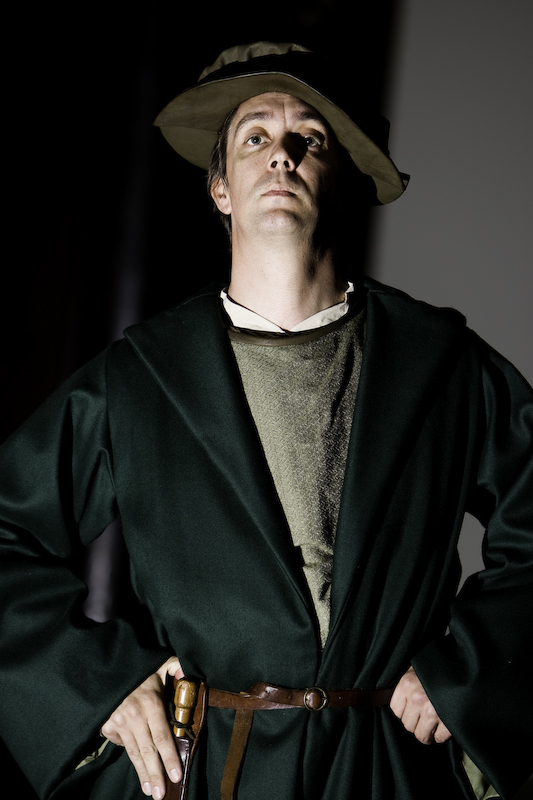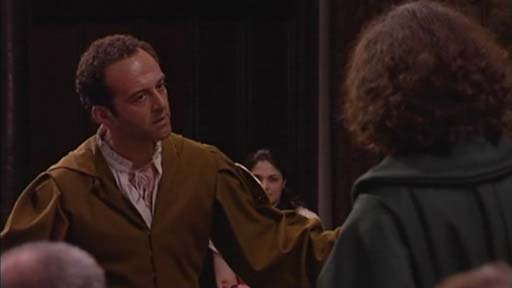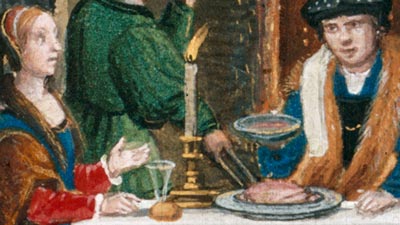The Ranger and Court Servants
Dr Eleanor Rycroft

The character of The Ranger invites two very contradictory interpretations depending upon the way the role is performed. He can either be viewed as an extremely sympathetic or an extremely rude character. In our 2009 production we decided upon the former, heeding the plea for protection from poverty and hunger made during his suit. Yet other productions of the play might foreground his need to see Jupiter at all costs, even if that means barging past Merry Report, and so disobeying the rigid rules of courtly protocol. That The Ranger's demand to see Jupiter is followed by Merry Report's, "Why, nay sir, by the Masse, yea!" (439) might even indicate a tussle between the two.
Merry Report does not deem The Ranger worthy enough to see Jupiter, and yet, in this character, we are presented with a figure who might have been seen as an indispensable part of courtly life. For it was not only within the architectural bounds of palaces that the notion of courtliness operated; the surrounding areas and peripheries also came under the rubric of a royal palace. In fact, during the early years of Henry's reign recorded in Hall's Chronicle, outdoor spaces feature heavily, befitting a monarch given to hunting, jousting and wrestling. On May Day, for instance, there appear to have been regular celebratory jousts, and there is a strong sense in the Chronicle that much of Henry's activity was conducted outdoors - especially as a young king.
Theatrical Director Gregory Thompson on The Ranger
The sort of sporting and recreational events that occurred in courtly environs cannot be so easily distinguished from the plays, masques and theatre that happened within their buildings. Outdoor events were also heavily orchestrated and sometimes scripted, and their purpose was for the entertainment of courtiers and visitors. Sometimes the two bleed into each other and the distinction between 'outside' and 'inside' is rendered obsolete. At Henry's coronation banquet, for instance, Hall records that the Duke of Buckingham entered Westminster Hall on a courser, and was succeeded by Robert Dimmocke also riding into the hall during the second course, offering to fight anyone who challenges the King's claim to the throne (2002, p25, p27). Such dramatic performances displayed Henry's magnificence and augmented his power, and their dazzling effect was no doubt heightened by the incongruity of a horse being ridden indoors.
Conversely, during the Robin Hood entertainments at Greenwich on May Day, 1515, the customary jousts were preceded by an audience witnessing the King and Queen interacting with 'Robin Hood', a scene followed by a woman sitting on a chariot drawn by five horses, upon each of which a lady rode (p56-7). Outdoors entertainments could therefore have a scripted and spectacular quality which approximated the verbal element of plays and the genre of the masque.
With an emphasis on outdoor space as integral to the conception of the court as a whole, The Ranger's plea cannot be dismissed. Tending to such peripheral areas can be seen as a crucial courtly occupation. But the itinerancy of the court meant that rangers had to be mobile and therefore did not always have access to the privileges of Bouche of Court. That The Ranger's lifestyle entails expense is intimated by his statement, "Many times and oft, where we be flitting/ We spend forty pence a piece at a sitting" (418-9). Knowing this makes the Ranger's assertion of economic need all the more poignant, and his desperation to argue his case directly to Jupiter more understandable.
Greg Walker court insiders and outsiders
The Eltham Ordinances of 1526 make clear that the outer bounds of the court were subject to the same level as control as the palace itself. Under the section headed 'Dispoile of Pleasures and Commodities in Noblemen's and Gentlemen's Houses to be left', it is not only areas of the King's own house or houses he visits ("lockes of doors, tables, formes, cupboards, tressells"), but also the store of the land ("deer, fish, orchards, hay, corne, grasse, pastire") which "is by ravine taken, dispoiled, wasted and spent" (1790, p145). The extension of courtly authority beyond the ostensible bounds of a building is further evident in the instruction that "no persone presume to take by high words, ravine, violent countenance, or other undue meanes, any vyctualls, hay, corne". While this seems reasonable, The Ranger presents the audience with an alternative to what is depicted in The Eltham Ordinances, that members of the court are provided for in their occupations, and perhaps an exposition of why the King's goods are at risk of being taken "by high words [and] violent countenance" (ibid.) - behaviours which are not unlike those The Ranger displays on his entrance.
That the character might have specific resonances for a contemporary audience is discussed by Tom Betteridge in the forum when he writes that The Ranger's complaint about windfall, "can be read as a defence of the kind of 'official' income, or windfall, that professional courtiers and court servants relied upon. This was, however, precisely the kind of income that was most open to criticism by those hostile to the court. Heywood's Ranger articulates a defence of windfall which makes him a potential spokesman for Heywood and his fellow court servants and courtiers".
The Ranger therefore represents an ambiguous relation to the court; both inside and an outside; not unlike the land upon which he worked.
References:
Janette Dillon, Performance and Spectacle in Hall's Chronicle (London: Society for Theatre Research, 2002)
The Society of Antiquaries (ed.), A Collection of Ordinances and Regulations for the Government of the Royal Household, Made in Divers Reigns. From King Edward III to King William and Queen Mary. Also Receipts in Ancient Cookery, 2 vols. (London, 1790).












